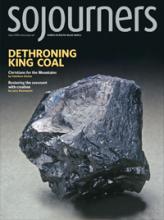Onelilove Alston: What is your professional background?
Allen Johnson: My undergraduate degree is in theology; my graduate degree was in biology. In the late 1970s I began to stretch out and grow in my faith. Though I grew up in the church, I had to find my own faith. I don’t want abstract theology but public theology—what does it mean to be a Christian today in the culture I am in? That is my highest driving force, the fire in my belly.
What faith tradition did you grow up in?
My mom was Reformed; my dad was Church of the Brethren. I attended a Brethren College. In 1968, while students were protesting against the Vietnam War, I went out with other students to protest against them and somehow (it was a God thing) I saw the darkness in my own heart. In the late 1970s the charismatic movement made a big impact on me. I am with a pretty conservative charismatic church, but they like what I do.
What are some examples of the historic disenfranchisement in coal producing areas?
One way to understand the economics of coal is that when the coal barons came here in the late 1800s, early 1900s, they bought up mineral rights from people because they were functionally illiterate. Over the decades, the high coal-producing areas became a mono-economy. Schools were not needed in the early heyday of the coal industry. You didn’t need education if you wanted to mine coal, and what happened is if a person did not want to mine coal they tended to leave because there wasn’t much else there. We had a certain brain drain or talent drain out of the coal fields.
Read the Full Article
